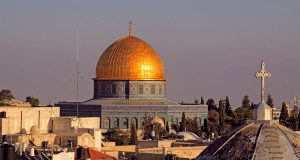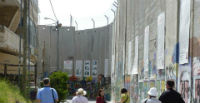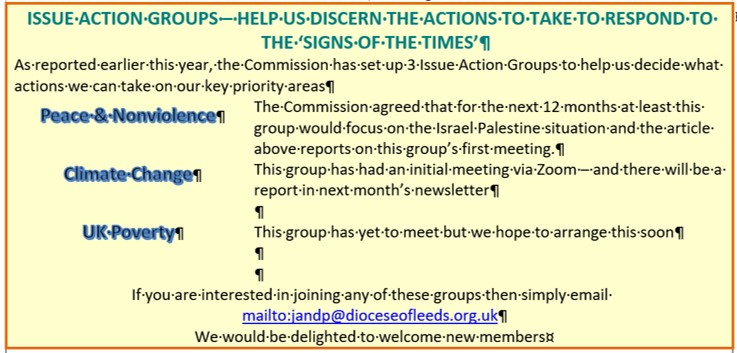Many people hope that one day they can go on pilgrimage to the Holy Land; to see for themselves the places where Jesus walked and where key events in the bible are thought to have taken place. All of us want to be able to identify better with the Gospel stories that we have heard since we started going to church. Even though there may be modern towns in those places there is something special about being where events have actually taken place.

What we sometimes forget is the context in which Jesus lived and the tragedy of the similarities of his situation with the situation that exists in the Holy Land today. We want to understand more about Jesus, so we crowd out the modern-day elements and, often, envisage a Holy Land full of holy people and idealised places. Adverts for Holy Land pilgrimages often reinforce this mental image.
Jesus’ family fled to Egypt to avoid the danger to their lives – they were refugees in Egypt. When they returned to Palestine, they returned to a region that was under military occupation by the Romans. In order to crucify Jesus, the permission of the Roman authorities had to be obtained – and it is worth remembering that the official charge against Jesus was subversion – plotting to overthrow the state!

Today, most Palestinian people live under occupation by the Israeli Government. They suffer fierce restrictions on where they can go, the documentation needed in order to be able to travel and the seizure of much of their land (despite international agreements to the contrary going back to the period following the 1967 war). The Israeli government has, for some time, been building a ‘security barrier’ to separate Israeli land from Palestinian land. This has also resulted in much hardship for most Palestinians. This is the Holy Land today.
The situation raises some ethical dilemmas for Christians. How can we go on pilgrimage to the Holy Land without supporting the terrible injustices inflicted on the Palestinian people today? – It is a question many of us will shy away from – it goes in the “too difficult” box. The last thing I want to do is discourage anyone from going to the Holy Land. However, I believe that there are things that we can, and should, do to ensure that we limit our complicity in the injustices that are ongoing.
This was one of the key areas that the new Peace & Nonviolence Issue Action Group of the Commission explored at its first meeting. This took place just before the lockdown wasimposed. This group of volunteers come from parishes and church communities across the Diocese – including Skipton, Mytholmroyd and the wider Leeds area. It also includes Tricia Griffin, a member of Sabeel Kairos in Yorkshire and part of the organising committee of the Leeds Palestinian Film Festival.We had all sorts of ideas about what we could do to promote the idea of pilgrimages that took better account of the current situation in the Holy Land. These ranged from a ‘preparation evening’ for those going on an organised pilgrimage to the Commission taking the lead in organising a pilgrimage itself (something it did in 2013 – which is where the picture above was taken).
At this point we felt that building awareness amongst would-be pilgrims was the most useful thing that we could do. This could be done through producing written or online resources – but there are many of those already in existence.
imposed. This group of volunteers come from parishes and church communities across the Diocese – including Skipton, Mytholmroyd and the wider Leeds area. It also includes Tricia
The real question is how to engage people in exploring the issues involved.
We felt that some sort of ‘Pilgrimage Preparation Evening’ would be a better way forward. This could be offered to any parish that was organising such a pilgrimage. Holy Land pilgrimages are not a cheap holiday and people want to get the most out of the experience. We thought we could capitalise on this interest by developing a format to specifically address people in a parish setting. The evening would include some tasters of the sorts of food that you can expect to find (food is always a good idea for an event of this sort!) as well as some basic information about how Palestinians have to live day to day and the opportunity for people to ask questions from people who have had first-hand experience of the plight of Palestinians today.
The group had a number of ideas for other sorts of events to build awareness of the plight of Palestinians. These included having a Day of Reflection as well as participating in the 2020 Leeds Palestinian Film festival (assuming it all goes ahead!). These are all things that you will hear more about as we work out the detail of what we can offer – even if it has to be a virtual offering!

